Trent Ruble's Blog: The Other Way It Is - Posts Tagged "usaf"
International Incident
In the early 1980s, while I was enlisted in the United States Air Force, I had the opportunity to visit communist East Germany. It was known among aircrew members at the time that, if we wore our uniforms, we were allowed to enter East Germany and return safely to the West. Although I very much considered the Soviets and their satellites to be our enemies, I'd always been fascinated by the mystery of the communist world. So, when my fellow airman, Todd Vangundy, and I found ourselves assigned to a mission to Tempelhof Airport in West Berlin, we made sure to pack our dress blues. In those days we were not allowed to wear work uniforms (flight suits) off base like service members do today.
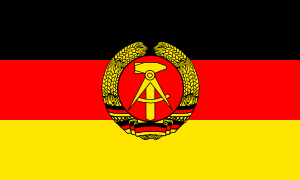
Upon our arrival in Berlin we quickly unloaded the giant cargo plane and then proceeded to our room to change clothes. We next made our way to the Berlin Wall's Checkpoint Charlie, the designated crossing for Allied military personnel wanting access to East Berlin. However, prior to crossing over to the dark side, we were required to attend a briefing. The only thing I remember from the briefing is what we were told about returning; once we entered the passageway back to the West, we were not to stop walking for any reason.
At the end of the briefing we proceeded through the Iron Curtain to East Berlin. If I recall, the crossing was only about 20 or 30 yards long. At the other end was a gate or door on one side and a guard shack on the other. We proceeded through the gate and into the red state.
Todd and I toured around the city noticing immediately how quiet and drab it was when compared to the West. However, the people we met were warm and friendly. We ate lunch in a hotel where, at least on the inside, it seemed quite lively. Upon paying our bill I received coins back as change and noticed that they felt more like plastic than metal. I still have one of those plastic coins today. After several hours we made our way back to the crossing. It was here that I nearly caused an international incident.
Todd and I approached the gate and he went through first. I followed and instantly heard the East German guard yelling at me in German. At that time I wasn't far removed from my high school German class but, even so, I couldn't understand anything the guard was saying. It didn't take long to figure it out, though. Upon looking back I saw the guard pointing at the wide open gate while screaming at me. I knew he wanted me to return and close the gate. Even in the midst of the situation I wondered why the gate didn't close automatically. But I wasn't going back. All I could think of at the time was what we'd been told in our pre-crossing briefing; "Whatever you do, do not stop walking once you start through the passageway." I, for one, did not want to spend the rest of my life in the Eastern Bloc! I continued walking and the guard continued screaming. I have never been so relieved as I was when I was completely through that passageway and back in the good old Western World! I have always hoped that, because I'd left the gate open, some desperate East Germans were able to escape! (Not likely.)

Upon our arrival in Berlin we quickly unloaded the giant cargo plane and then proceeded to our room to change clothes. We next made our way to the Berlin Wall's Checkpoint Charlie, the designated crossing for Allied military personnel wanting access to East Berlin. However, prior to crossing over to the dark side, we were required to attend a briefing. The only thing I remember from the briefing is what we were told about returning; once we entered the passageway back to the West, we were not to stop walking for any reason.
At the end of the briefing we proceeded through the Iron Curtain to East Berlin. If I recall, the crossing was only about 20 or 30 yards long. At the other end was a gate or door on one side and a guard shack on the other. We proceeded through the gate and into the red state.
Todd and I toured around the city noticing immediately how quiet and drab it was when compared to the West. However, the people we met were warm and friendly. We ate lunch in a hotel where, at least on the inside, it seemed quite lively. Upon paying our bill I received coins back as change and noticed that they felt more like plastic than metal. I still have one of those plastic coins today. After several hours we made our way back to the crossing. It was here that I nearly caused an international incident.
Todd and I approached the gate and he went through first. I followed and instantly heard the East German guard yelling at me in German. At that time I wasn't far removed from my high school German class but, even so, I couldn't understand anything the guard was saying. It didn't take long to figure it out, though. Upon looking back I saw the guard pointing at the wide open gate while screaming at me. I knew he wanted me to return and close the gate. Even in the midst of the situation I wondered why the gate didn't close automatically. But I wasn't going back. All I could think of at the time was what we'd been told in our pre-crossing briefing; "Whatever you do, do not stop walking once you start through the passageway." I, for one, did not want to spend the rest of my life in the Eastern Bloc! I continued walking and the guard continued screaming. I have never been so relieved as I was when I was completely through that passageway and back in the good old Western World! I have always hoped that, because I'd left the gate open, some desperate East Germans were able to escape! (Not likely.)
Published on November 04, 2012 09:25
•
Tags:
air-force, aircraft, aircrew, airplane, berlin, border, border-crossing, c141, communist, east-germany, eastern-bloc, germany, international, military, military-service, russian, starlifter, travel, united-states-air-force, us-airforce, usaf, west-berlin
International Incident, Part 2
From 1980 to 1984 I was an aircraft loadmaster assigned to the United States Air Force's 20th Military Airlift Squadron in Charleston, South Carolina. From there, our C-141 Starlifter crews delivered people and cargo to airports and air force bases all over the world. Occasionally, when visiting these exotic locations, our crew members would run afoul of local procedures with which they weren't familiar. I previously wrote of the International Incident (November 4th, 2012) I nearly caused in Berlin, but that wasn't the only one.
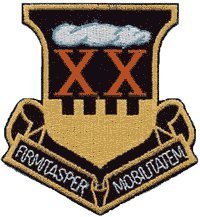
Another of our trips was a routine passenger mission called the "Eagle," which staged in Frankfurt and Athens. Staging meant the aircrew would rest while the plane continued with a new crew. Then, usually the next day, the original aircrew would pick up another plane coming through, already loaded, and continue on. After staging in Athens, an Eagle crew would take the plane to three stops in Turkey and return to Athens in one day. We called that day the "Turkey Trot." One of those stops was at Izmir Air Base near Istanbul, Turkey.
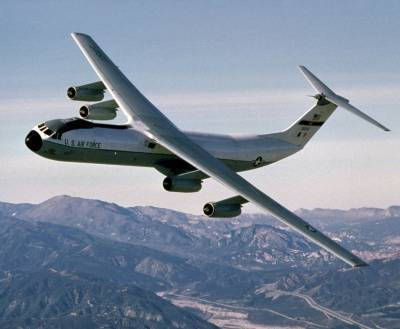
Because Izmir was our first stop in Turkey, we were always met by Turkish customs agents. It was their job to ensure we weren't carrying any of the items prohibited in Turkey: pork, Coca-Cola, or pornography. Any US military aircraft or vessel is considered by the United States to be sovereign US territory regardless of where it sits and, therefore, not subject to search of any kind. But, rather than cause unnecessary conflict, we used a more diplomatic approach. Upon our arrival we always offered the agents coffee and American snacks and they, in return, would not ask us to drag our bags. It was a nice arrangement that worked well.

It was part of a loadmaster's job to make sure there was enough coffee and food on board for the sometimes very long and crowded flights. Unfortunately, on one of the Eagle missions to which I was assigned, we were running low. Upon our arrival at Izmir, the agents came on board as they usually did and started to pour themselves coffee. I stopped them and explained the situation thinking that, based on our long history of cooperation, they would understand. But, they didn't. The agents became unreasonable insisting that we remove all of our personal luggage. The Aircraft Commander gathered the crew and asked if any of us had any of the prohibited items. None of us did, unlikely as it was. So, at the commander's order, we removed our bags and allowed the customs agents to search them. When they were finished we loaded the bags and continued with our mission. The international incident was diffused. But, because I was perceived by the rest of the crew to be the one who allowed the coffee and food to run low, thus allowing the situation to unfold, I was not the most popular guy the rest of the trip.
More recently, a fellow loadmaster with whom I flew several missions, a loadmaster who'd made the job his career and is still flying today, told me that all crew members on USAF cargo planes now fly armed (in the 1980s we usually didn't) and no foreign nationals are allowed on board the aircraft. He said there have been incidents in which crew members have had to draw their weapons in order to prevent customs agents from coming on board. I'm glad it didn't come to that during my encounter, especially since we weren't armed. Oh, how the world has changed.

Another of our trips was a routine passenger mission called the "Eagle," which staged in Frankfurt and Athens. Staging meant the aircrew would rest while the plane continued with a new crew. Then, usually the next day, the original aircrew would pick up another plane coming through, already loaded, and continue on. After staging in Athens, an Eagle crew would take the plane to three stops in Turkey and return to Athens in one day. We called that day the "Turkey Trot." One of those stops was at Izmir Air Base near Istanbul, Turkey.

Because Izmir was our first stop in Turkey, we were always met by Turkish customs agents. It was their job to ensure we weren't carrying any of the items prohibited in Turkey: pork, Coca-Cola, or pornography. Any US military aircraft or vessel is considered by the United States to be sovereign US territory regardless of where it sits and, therefore, not subject to search of any kind. But, rather than cause unnecessary conflict, we used a more diplomatic approach. Upon our arrival we always offered the agents coffee and American snacks and they, in return, would not ask us to drag our bags. It was a nice arrangement that worked well.

It was part of a loadmaster's job to make sure there was enough coffee and food on board for the sometimes very long and crowded flights. Unfortunately, on one of the Eagle missions to which I was assigned, we were running low. Upon our arrival at Izmir, the agents came on board as they usually did and started to pour themselves coffee. I stopped them and explained the situation thinking that, based on our long history of cooperation, they would understand. But, they didn't. The agents became unreasonable insisting that we remove all of our personal luggage. The Aircraft Commander gathered the crew and asked if any of us had any of the prohibited items. None of us did, unlikely as it was. So, at the commander's order, we removed our bags and allowed the customs agents to search them. When they were finished we loaded the bags and continued with our mission. The international incident was diffused. But, because I was perceived by the rest of the crew to be the one who allowed the coffee and food to run low, thus allowing the situation to unfold, I was not the most popular guy the rest of the trip.
More recently, a fellow loadmaster with whom I flew several missions, a loadmaster who'd made the job his career and is still flying today, told me that all crew members on USAF cargo planes now fly armed (in the 1980s we usually didn't) and no foreign nationals are allowed on board the aircraft. He said there have been incidents in which crew members have had to draw their weapons in order to prevent customs agents from coming on board. I'm glad it didn't come to that during my encounter, especially since we weren't armed. Oh, how the world has changed.
Published on March 17, 2013 09:19
•
Tags:
20th-mas, airforce, customs, internationalrelations, military, military-airlift-command, turkey, unitedstateairforce, usaf, usairforce, xx-mas
Goodbye Starlifter
From 1963 through 1967, the Lockheed Corporation (known since 1995 as Lockheed Martin) delivered 285 "Tubes of Pain," officially known as C-141 Starlifters, to the United States Air Force. The giant cargo planes represented a new, jet-propelled, long-range alternative to the propeller-driven cargo planes of the past. The high-speed, high-flying planes were capable of carrying up to 45 tons of cargo or 200 troops. Together, they transported millions of tons of military personnel and equipment, including a serious amount of MAC artifacts (aircrew souvenirs), to points around the world until they were taken out of service in 2006 (The Aviation Zone).

The most well-known of these massive air machines was the "Hanoi Taxi," made famous in 1973 as the first aircraft to return American prisoners of war to the United States from Vietnam (National Museum of the United States Air Force). The Taxi was again called upon for evacuation services after Hurricane Katrina struck the American Gulf Coast in 2005 (Air Force Reserve Command). This storied aircraft can still be seen today at the National Museum of the United States Air Force near Dayton, Ohio, where it is on permanent display.
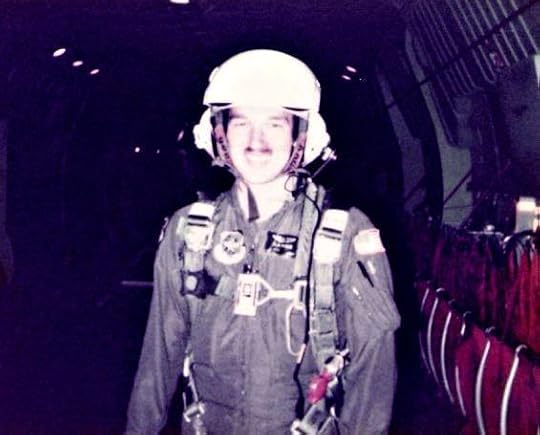
I served as a loadmaster aboard Starlifters from 1980 to 1984, which put me in charge of loading and offloading cargo and of any in-flight passengers. Being "in charge" was a little awkward at first when I was fresh out of tech school at age 19. But, the more experienced loading crews, sometimes 20 year veterans, understood the situation and were usually very respectful about it. I was assigned to the 20th Military Airlift Squadron at Charleston Air Force Base, South Carolina. From there we flew to locations throughout the Americas, as well as Europe, Africa and Asia. It was peacetime and our missions were generally routine with an occasional flash of excitement, such as the International Incident and the International Incident, Part 2. Our squadron was also involved in missions supporting Operation Urgent Fury; the eviction of the Cubans after their ill-advised October 1983 invasion of Grenada.
 Fort Wayne, Indiana, 1997
Fort Wayne, Indiana, 1997
Photo by Tami Ruble
After four years of flying with the well-trained, yet sometimes inexperienced, Air Force pilots, I knew I'd cheated death long enough (see In-Flight Emergency!). On April 11, 1984, I said goodbye to the Starlifter never to fly on her again. I was, however, fortunate enough to board a 141 one last time in 1997 as it was parked in static display at an airshow in Fort Wayne, Indiana. I enjoyed the opportunity to reminisce while, at the same time, showing my wife and sons the great airplane I once called home. It won't likely happen again, though, as the Air Force, since 2006, has been dismantling the once great airships in the Arizona desert. A sad end to the truly great work-horse of the sky; the Lockheed C-141 Starlifter.
 Davis-Monthan Air Force Base, Arizona
Davis-Monthan Air Force Base, Arizona

The most well-known of these massive air machines was the "Hanoi Taxi," made famous in 1973 as the first aircraft to return American prisoners of war to the United States from Vietnam (National Museum of the United States Air Force). The Taxi was again called upon for evacuation services after Hurricane Katrina struck the American Gulf Coast in 2005 (Air Force Reserve Command). This storied aircraft can still be seen today at the National Museum of the United States Air Force near Dayton, Ohio, where it is on permanent display.

I served as a loadmaster aboard Starlifters from 1980 to 1984, which put me in charge of loading and offloading cargo and of any in-flight passengers. Being "in charge" was a little awkward at first when I was fresh out of tech school at age 19. But, the more experienced loading crews, sometimes 20 year veterans, understood the situation and were usually very respectful about it. I was assigned to the 20th Military Airlift Squadron at Charleston Air Force Base, South Carolina. From there we flew to locations throughout the Americas, as well as Europe, Africa and Asia. It was peacetime and our missions were generally routine with an occasional flash of excitement, such as the International Incident and the International Incident, Part 2. Our squadron was also involved in missions supporting Operation Urgent Fury; the eviction of the Cubans after their ill-advised October 1983 invasion of Grenada.
 Fort Wayne, Indiana, 1997
Fort Wayne, Indiana, 1997 Photo by Tami Ruble
After four years of flying with the well-trained, yet sometimes inexperienced, Air Force pilots, I knew I'd cheated death long enough (see In-Flight Emergency!). On April 11, 1984, I said goodbye to the Starlifter never to fly on her again. I was, however, fortunate enough to board a 141 one last time in 1997 as it was parked in static display at an airshow in Fort Wayne, Indiana. I enjoyed the opportunity to reminisce while, at the same time, showing my wife and sons the great airplane I once called home. It won't likely happen again, though, as the Air Force, since 2006, has been dismantling the once great airships in the Arizona desert. A sad end to the truly great work-horse of the sky; the Lockheed C-141 Starlifter.
 Davis-Monthan Air Force Base, Arizona
Davis-Monthan Air Force Base, Arizona
Published on August 04, 2013 10:20
•
Tags:
aircraft, aircrew, airforce, airplane, c141, military, militaryservice, starlifter, unitedstatesairforce, usaf, usairforce
How I became the Unintentional Explorer: My Enlistment in the United States Air Force
I graduated from high school in May 1979 and decided not to go to college. I didn't know what I wanted to do in life anyway, so why waste money in attending college just for the sake of attending? It turned out that the only thing really being wasted was my life. And, I wasn't the only one to notice. My parents, especially my dad, were getting tired of seeing me flounder and also tired of me living in their house as I neared 20 years old.
By December I was still living at home and working at a local drug store. Dad had frequently suggested I join the military but that sounded like a horrible idea. I mean, the only thing I didn't like about living at home was Mom and Dad telling me what to do. The military sounded to me like a whole lot more of the same. However, Dad told me a story one day that caught my interest.
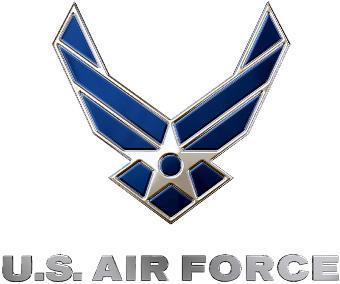
Dad said that, when he was in the Air Force in the late 1950s, he was sent on a temporary assignment to Puerto Rico. During the several hour flight in the cargo plane from his base in Texas, he had the opportunity to spend time with the plane's loadmaster. He learned that the loadmaster loved his job, which consisted of supervising the rear of the plane (cargo and passengers). He especially enjoyed having visited over 30 countries in four years of flying.
Dad then encouraged me to talk to an Air Force recruiter about being a loadmaster, but I instantly thought about basic training and how awful that would be. I declined. But, Dad persisted by saying that maybe I could just listen to the recruiter and make a decision at a later time, so I agreed.
My dad and I went to the U. S. Air Force Recruiting Office in nearby Fort Wayne where the recruiter explained the loadmaster position to me as well as the requirements for getting the job. One of those requirements was to score high enough on the ASVAB (Armed Services Vocational Aptitude Battery) and he suggested I take it. He said there was no commitment involved but, without the test, there was no sense in continuing to discuss being a loadmaster, so I agreed.
My ASVAB score was high enough to be considered, so the recruiter told me that I should take the required physical examination at the MEPS (Military Entrance Processing Station) in Indianapolis. He said there was no committment involved but, without passing the physical, there was no sense in continuing to discuss being a loadmaster, so I agreed.
On December 31, 1979, I traveled to Indianapolis where, along with several other recruits, we took the physical exam. After passing, we were herded into a room with a podium in front of a couple dozen chairs. There were flags on each side of the podium making it look very official. We were told that we were in the room because we had passed the physical and were now going to be given the opportunity to enlist. Somehow, this whole process seemed orchestrated from the start. I knew the most logical thing to do was to decline the enlistment and go home and think about it so that I could make a rational decision. But, I also knew what the decision would be. My life had no purpose the way it was and the Air Force offered the opportunity for adventure and excitement, as well as the opportunity to make a difference in the world. I made the decision, took the oath and was placed on delayed enlisted that day.
On April 11, 1980, I returned to MEPS for in-processing. Unfortunately, my suitcase didn't make the trip as I'd left it at the bus station back home. My parents made a special 200-mile round trip just to bring it to me. The next day I flew off to Lackland Air Force Base in San Antonio to begin the adventure (see All-Expense Paid Vacation in Sunny San Antonio!).
It's been many years now since I was in the Air Force, but I think about it often. I was able to visit more than 30 countries in four years, just as the loadmaster years before had done. Not only that, there were many adventures that I'll never forget (see International Incident, International Incident, Part 2 , and In-Flight Emergency!). I'm proud of my service and miss that time in my life. I would encourage any young person who doesn't have a plan for what to do with his or her life to consider the military. It can be a very rewarding experience.
By December I was still living at home and working at a local drug store. Dad had frequently suggested I join the military but that sounded like a horrible idea. I mean, the only thing I didn't like about living at home was Mom and Dad telling me what to do. The military sounded to me like a whole lot more of the same. However, Dad told me a story one day that caught my interest.

Dad said that, when he was in the Air Force in the late 1950s, he was sent on a temporary assignment to Puerto Rico. During the several hour flight in the cargo plane from his base in Texas, he had the opportunity to spend time with the plane's loadmaster. He learned that the loadmaster loved his job, which consisted of supervising the rear of the plane (cargo and passengers). He especially enjoyed having visited over 30 countries in four years of flying.
Dad then encouraged me to talk to an Air Force recruiter about being a loadmaster, but I instantly thought about basic training and how awful that would be. I declined. But, Dad persisted by saying that maybe I could just listen to the recruiter and make a decision at a later time, so I agreed.
My dad and I went to the U. S. Air Force Recruiting Office in nearby Fort Wayne where the recruiter explained the loadmaster position to me as well as the requirements for getting the job. One of those requirements was to score high enough on the ASVAB (Armed Services Vocational Aptitude Battery) and he suggested I take it. He said there was no commitment involved but, without the test, there was no sense in continuing to discuss being a loadmaster, so I agreed.
My ASVAB score was high enough to be considered, so the recruiter told me that I should take the required physical examination at the MEPS (Military Entrance Processing Station) in Indianapolis. He said there was no committment involved but, without passing the physical, there was no sense in continuing to discuss being a loadmaster, so I agreed.
On December 31, 1979, I traveled to Indianapolis where, along with several other recruits, we took the physical exam. After passing, we were herded into a room with a podium in front of a couple dozen chairs. There were flags on each side of the podium making it look very official. We were told that we were in the room because we had passed the physical and were now going to be given the opportunity to enlist. Somehow, this whole process seemed orchestrated from the start. I knew the most logical thing to do was to decline the enlistment and go home and think about it so that I could make a rational decision. But, I also knew what the decision would be. My life had no purpose the way it was and the Air Force offered the opportunity for adventure and excitement, as well as the opportunity to make a difference in the world. I made the decision, took the oath and was placed on delayed enlisted that day.
On April 11, 1980, I returned to MEPS for in-processing. Unfortunately, my suitcase didn't make the trip as I'd left it at the bus station back home. My parents made a special 200-mile round trip just to bring it to me. The next day I flew off to Lackland Air Force Base in San Antonio to begin the adventure (see All-Expense Paid Vacation in Sunny San Antonio!).
It's been many years now since I was in the Air Force, but I think about it often. I was able to visit more than 30 countries in four years, just as the loadmaster years before had done. Not only that, there were many adventures that I'll never forget (see International Incident, International Incident, Part 2 , and In-Flight Emergency!). I'm proud of my service and miss that time in my life. I would encourage any young person who doesn't have a plan for what to do with his or her life to consider the military. It can be a very rewarding experience.
Published on April 20, 2017 14:18
•
Tags:
air-cargo, air-force, loadmaster, military, military-service, service, united-states-air-force, us-air-force, usaf, world-travel
Freshman Year
When the students were moving in this year at the university where I work, it caused me to think back to my own "freshman year." It wasn't a college where I spent my first year away from home. Instead, I moved into a barracks at Charleston Air Force Base.
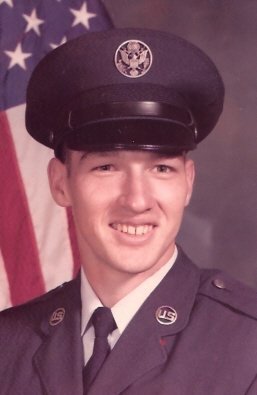 Me in 1980, my "freshman year."
Me in 1980, my "freshman year."
Generally, enlisted airmen shared rooms with at least one roommate, but aircrew at Charleston were to get single rooms due to their irregular schedules. However, in my barracks, there weren't enough rooms so the two newest residents had to share and, of course, that initially included me. My new roommate was an airman from Miami who'd been living alone and wasn't too excited to see me. But, it wasn't long before another room opened and he moved out. It was then that I lived alone for the very first time.
In looking back on those days, I find that there are some similarities between life in a military barracks and life at a college dormitory. I lived in a building with dozens of other young people, one of whom is still my friend today. Some of them would do stupid things like smoke marijuana and lose their aircrew status, or get drunk and run around outside in their underwear. But, we also had to learn to get along with each other, keep our rooms clean, study and go to class just like college students.
But there are some pretty significant differences. Our primary function was to go to work. As you can imagine, the military is very strict about arriving to work on time and in a sober condition. This curtailed the partying in many (but not all) barracks. And, most work performed by young military men and women is at a significantly higher level than that performed by civilians of a similar young age. I was an aircraft loadmaster. But, some of the high level jobs performed by young military members include Nuclear Electronics Technician, Scientific Applications Specialist, Cryptologic Technician, Satellite Communication Systems Operator and many, many more. In addition, we were required to maintain ourselves (hygiene, uniforms, fitness, etc...) But, the biggest differences between students and airmen, soldiers, sailors and marines were the mission and team doctrines under which we lived. Nothing is more important to members of the military than our mission and our teammates. Many military lives have been lost in trying to complete a mission or save our comrade.
I don't intend to diminish the importance of higher education. In fact, I must acknowledge here that, although college students aren't pressed into service as quickly as members of the military, I am aware that their education can take them much further than what most enlisted people can hope for and can result in a rewarding occupation that can benefit all of society.
For some it's tough being away from home at such a young age but, for me, it was rewarding as well. I quickly learned to take responsibility seriously and to take care of myself. In the military I grew up rapidly, but not completely. Never completely.
 Me in 1980, my "freshman year."
Me in 1980, my "freshman year."Generally, enlisted airmen shared rooms with at least one roommate, but aircrew at Charleston were to get single rooms due to their irregular schedules. However, in my barracks, there weren't enough rooms so the two newest residents had to share and, of course, that initially included me. My new roommate was an airman from Miami who'd been living alone and wasn't too excited to see me. But, it wasn't long before another room opened and he moved out. It was then that I lived alone for the very first time.
In looking back on those days, I find that there are some similarities between life in a military barracks and life at a college dormitory. I lived in a building with dozens of other young people, one of whom is still my friend today. Some of them would do stupid things like smoke marijuana and lose their aircrew status, or get drunk and run around outside in their underwear. But, we also had to learn to get along with each other, keep our rooms clean, study and go to class just like college students.
But there are some pretty significant differences. Our primary function was to go to work. As you can imagine, the military is very strict about arriving to work on time and in a sober condition. This curtailed the partying in many (but not all) barracks. And, most work performed by young military men and women is at a significantly higher level than that performed by civilians of a similar young age. I was an aircraft loadmaster. But, some of the high level jobs performed by young military members include Nuclear Electronics Technician, Scientific Applications Specialist, Cryptologic Technician, Satellite Communication Systems Operator and many, many more. In addition, we were required to maintain ourselves (hygiene, uniforms, fitness, etc...) But, the biggest differences between students and airmen, soldiers, sailors and marines were the mission and team doctrines under which we lived. Nothing is more important to members of the military than our mission and our teammates. Many military lives have been lost in trying to complete a mission or save our comrade.
I don't intend to diminish the importance of higher education. In fact, I must acknowledge here that, although college students aren't pressed into service as quickly as members of the military, I am aware that their education can take them much further than what most enlisted people can hope for and can result in a rewarding occupation that can benefit all of society.
For some it's tough being away from home at such a young age but, for me, it was rewarding as well. I quickly learned to take responsibility seriously and to take care of myself. In the military I grew up rapidly, but not completely. Never completely.
Published on August 23, 2017 13:45
•
Tags:
air-force, barracks, college, dormitories, dormitory, dorms, military, students, united-states-air-force, us-air-force, usaf
Tag Along
As I've said previously, I traveled frequently in the early 1980s as an aircraft loadmaster in the United States Air Force. For a young guy like me, this provided a great opportunity to see the world that I wouldn't have otherwise had. Many of our trips would take us to one of the several large Military Airlift Command (MAC) bases in Europe and, upon arriving in one of these great places, I would always want to see the sights. Most of the other enlisted crew members were only interested in finding the nearest bar, which just wasn't for me. So, I would frequently tag along with the officers who were much more inclined to be tourists. The officers were generally more established in life than I was so, many times, they would even let me ride in their rental car for free.
One such opportunity came when our crew stopped at Rhein Main Air Base near Frankfurt, Germany. After arriving at our hotel, I overheard the officers talking about going on a volksmarch in nearby Ansbach. A volksmarch, they explained, was a sort of walking tour and was very common in Germany. As I frequently did, I asked if I could go along and they agreed. The next day the officers rented a car from near the adjacent civilian airport and we all piled in. The car was a very small Alfa Romeo Alfasud like this one:

There were five of us, which means there must have been at least one other enlisted guy with us as we never carried that many officers (I can't remember who any of them were). I remember sitting in the middle of the very tight back seat. It wasn't comfortable but it was a small price to pay for the opportunity to explore Germany! Once we arrived in Ansbach, we proceeded to a sort of check-in area where we were given a map of the volksmarch and then just started walking. We walked through the city, the beautiful countryside, a small town and even a forest. The march was 10 kilometers of pure enjoyment. I loved seeing all the varied sights in such a short walk and the weather was perfect. When we finished, we were given a participation medal which, unfortunately, I have since lost.
After the walk it was time for the five of us to pile into the car again and head back to reality. The little overloaded Alfa was nearly maxed out as we zoomed down the autobahn at about 90 mph which, even at that speed, made us one of the slowest cars on the road. Just before we reached the airport, there was a loud bang. I looked behind us in time to see a cloud of smoke coming from the car as our speed slowed dramatically. At this point I was really glad my name wasn't on that rental contract! The officer driving just kept going, although much more slowly as the car couldn't regain its previous speed. At the airport he parked the car, returned the keys and we left without him telling them what had happened. I never heard if there were any consequences for this but, the following day, we boarded our aircraft and disappeared.
One such opportunity came when our crew stopped at Rhein Main Air Base near Frankfurt, Germany. After arriving at our hotel, I overheard the officers talking about going on a volksmarch in nearby Ansbach. A volksmarch, they explained, was a sort of walking tour and was very common in Germany. As I frequently did, I asked if I could go along and they agreed. The next day the officers rented a car from near the adjacent civilian airport and we all piled in. The car was a very small Alfa Romeo Alfasud like this one:

There were five of us, which means there must have been at least one other enlisted guy with us as we never carried that many officers (I can't remember who any of them were). I remember sitting in the middle of the very tight back seat. It wasn't comfortable but it was a small price to pay for the opportunity to explore Germany! Once we arrived in Ansbach, we proceeded to a sort of check-in area where we were given a map of the volksmarch and then just started walking. We walked through the city, the beautiful countryside, a small town and even a forest. The march was 10 kilometers of pure enjoyment. I loved seeing all the varied sights in such a short walk and the weather was perfect. When we finished, we were given a participation medal which, unfortunately, I have since lost.
After the walk it was time for the five of us to pile into the car again and head back to reality. The little overloaded Alfa was nearly maxed out as we zoomed down the autobahn at about 90 mph which, even at that speed, made us one of the slowest cars on the road. Just before we reached the airport, there was a loud bang. I looked behind us in time to see a cloud of smoke coming from the car as our speed slowed dramatically. At this point I was really glad my name wasn't on that rental contract! The officer driving just kept going, although much more slowly as the car couldn't regain its previous speed. At the airport he parked the car, returned the keys and we left without him telling them what had happened. I never heard if there were any consequences for this but, the following day, we boarded our aircraft and disappeared.
Published on November 23, 2017 23:09
•
Tags:
europe, germany, mac, military-airlift-command, tourism, tourist, united-states-air-force, us-air-force, usaf, volksmarch
Ladies and Gentlemen, this is NOT Your Captain Speaking...
Wouldn't it be scary to discover the person piloting your airplane had never done it before, had no training and had no idea what he was doing? That's exactly what happened one night in the early 1980s in a US Air Force C-141 Starlifter over the Mediterranean Sea.
Our crew was flying across the sea from Cairo to Athens with a load of cargo and just a few passengers. Like me, our plane was about 20 years old. I was the loadmaster. I was responsible for the on and off-loading, figuring the center of gravity and supervising passengers. So, unless we had passengers, my job was usually over once the plane took off. On this particular flight, it was late at night and the few passengers on board were sleeping. This meant some down time for me.
I climbed into the cockpit and sat in the jump seat. This was a small seat between and just behind the pilots' seats. I liked to do this because I felt more a part of the crew when I wasn't isolated in the back. Plus, I could see out the windows much better, although being over the sea at this time of night meant seeing only blackness.
After some time the flight engineer, who sat directly behind the co-pilot, got up to stretch his legs or use the bathroom. In his absence, the pilot, who also served as the aircraft commander, sat down at the engineer's panel. This was a panel full of gauges monitoring systems such hydraulics, pressurization, fuel, etc... It is my understanding that the aircraft commander must be qualified at this and every position on the plane, so we were not in any danger as he began adjusting things.
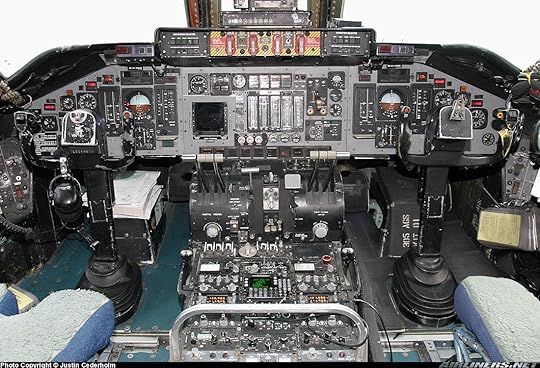
I said, "If the pilot can be the engineer, I think the loadmaster should be the pilot!" Of course I was kidding as I had no idea how to fly that airplane, nor did I want to. But the pilot, whose name I would not reveal even if I did remember it, said, "Sit down, Buddy," while pointing to the pilot's seat. I then started backpedaling saying, "I was just kidding. I wouldn't even know what to do." "Don't worry," he said, "I'll help you."
So, I sat down in the pilot's seat. In front of me was the yoke that looks somewhat like half a steering wheel and beside me to the right were the four throttle control levers, one for each of the jet engines. Behind the yoke was an array of gauges, one of which was a brown and white ball with an image of the airplane superimposed on it to indicate our position in relation to the horizon. All of these were intimidating to me.
After a few moments I realized I was doing pretty well as the plane was cruising along just as it had been. The pilot then disconnected the auto-pilot but, even then, the aircraft remained stable. I said, "This is easier than I thought." He said, "Why don't you turn your wheel just a little?" I did as he said and suddenly the airplane not only turned in that direction, but stated to fall from the sky! He said, "Now, increase the power." I pushed the throttles forward and the plane started to climb. He then instructed me to turn the airplane back to the direction we'd been going but, as I did this, it began to fall again. The brown and white ball was now in full wobble. I increased power again which caused me, and likely everyone else on board, to feel as if we were going to throw up. It was like an out-of-control roller coaster seven miles above the Earth! All the while, the pilot was calmly speaking to the Egyptian air-traffic controllers as if everything was normal. I wondered how a pilot could possibly keep all this under control while at the same time trying to decipher their poor English.
I told the pilot that I'd had enough of this adventure and asked if he would take over. After switching positions, I told him that I very much appreciated the experience but I didn't need to do that again. I returned to the cargo compartment where I felt much more comfortable. I found the previously sleeping passengers now awake and wondering if we'd had to avoid an especially bad storm. I explained that there had been a new pilot gaining some experience under the close supervision of the aircraft commander and they were never in danger. I wondered if that were true.
Our crew was flying across the sea from Cairo to Athens with a load of cargo and just a few passengers. Like me, our plane was about 20 years old. I was the loadmaster. I was responsible for the on and off-loading, figuring the center of gravity and supervising passengers. So, unless we had passengers, my job was usually over once the plane took off. On this particular flight, it was late at night and the few passengers on board were sleeping. This meant some down time for me.
I climbed into the cockpit and sat in the jump seat. This was a small seat between and just behind the pilots' seats. I liked to do this because I felt more a part of the crew when I wasn't isolated in the back. Plus, I could see out the windows much better, although being over the sea at this time of night meant seeing only blackness.
After some time the flight engineer, who sat directly behind the co-pilot, got up to stretch his legs or use the bathroom. In his absence, the pilot, who also served as the aircraft commander, sat down at the engineer's panel. This was a panel full of gauges monitoring systems such hydraulics, pressurization, fuel, etc... It is my understanding that the aircraft commander must be qualified at this and every position on the plane, so we were not in any danger as he began adjusting things.

I said, "If the pilot can be the engineer, I think the loadmaster should be the pilot!" Of course I was kidding as I had no idea how to fly that airplane, nor did I want to. But the pilot, whose name I would not reveal even if I did remember it, said, "Sit down, Buddy," while pointing to the pilot's seat. I then started backpedaling saying, "I was just kidding. I wouldn't even know what to do." "Don't worry," he said, "I'll help you."
So, I sat down in the pilot's seat. In front of me was the yoke that looks somewhat like half a steering wheel and beside me to the right were the four throttle control levers, one for each of the jet engines. Behind the yoke was an array of gauges, one of which was a brown and white ball with an image of the airplane superimposed on it to indicate our position in relation to the horizon. All of these were intimidating to me.
After a few moments I realized I was doing pretty well as the plane was cruising along just as it had been. The pilot then disconnected the auto-pilot but, even then, the aircraft remained stable. I said, "This is easier than I thought." He said, "Why don't you turn your wheel just a little?" I did as he said and suddenly the airplane not only turned in that direction, but stated to fall from the sky! He said, "Now, increase the power." I pushed the throttles forward and the plane started to climb. He then instructed me to turn the airplane back to the direction we'd been going but, as I did this, it began to fall again. The brown and white ball was now in full wobble. I increased power again which caused me, and likely everyone else on board, to feel as if we were going to throw up. It was like an out-of-control roller coaster seven miles above the Earth! All the while, the pilot was calmly speaking to the Egyptian air-traffic controllers as if everything was normal. I wondered how a pilot could possibly keep all this under control while at the same time trying to decipher their poor English.
I told the pilot that I'd had enough of this adventure and asked if he would take over. After switching positions, I told him that I very much appreciated the experience but I didn't need to do that again. I returned to the cargo compartment where I felt much more comfortable. I found the previously sleeping passengers now awake and wondering if we'd had to avoid an especially bad storm. I explained that there had been a new pilot gaining some experience under the close supervision of the aircraft commander and they were never in danger. I wondered if that were true.
Published on February 02, 2018 13:33
•
Tags:
air-force, aircraft, airplane, c-141, cargo-plane, flight, fly, flying, flying-lesson, loadmaster, pilot, starlifter, us-air-force, usaf
The Other Way It Is
The stories and opinions of author Trent Ruble.
Find Trent Ruble on Facebook at: https://www.facebook.com/taruble/ The stories and opinions of author Trent Ruble.
Find Trent Ruble on Facebook at: https://www.facebook.com/taruble/ ...more
Find Trent Ruble on Facebook at: https://www.facebook.com/taruble/ The stories and opinions of author Trent Ruble.
Find Trent Ruble on Facebook at: https://www.facebook.com/taruble/ ...more
- Trent Ruble's profile
- 17 followers



